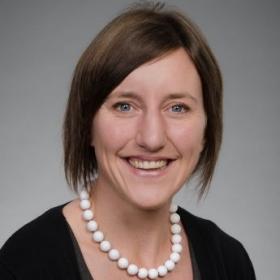As published on the AlzWA Blog by Marigrace Becker, MSW
Program Manager for Community Education and Impact, UW Memory and Brain Wellness Center
Learn about how virtual dementia-friendly programs have helped people with memory loss and their families stay socially, physically and cognitively active during the pandemic. Marigrace Becker, MSW will be presenting on this topic at the upcoming Discovery Conference for health care professionals, offered by the Alzheimer's Association WA State Chapter. Learn more and register for the conference here.
A year into the COVID-19 pandemic, the landscape of opportunities for people with memory loss and their families to stay socially, physically and cognitively active has shifted dramatically. While we’re still awaiting the return of community programs like Alzheimer’s cafés, memory loss choirs or dementia-friendly walking groups, a robust world of virtual dementia-friendly programs has emerged. And the benefits — such as reaching more people and people who may not have had access to in-person programs in their community — highlight the potential for virtual programs even when the pandemic subsides.

Marigrace Becker, MSW
Jen Kulik, whose company SilverKite Community Arts historically offered a wide array of creative engagement programs for all ages, was an early pioneer in the virtual space. In partnership with four library systems, SilverKite launched a variety of free virtual programs such as dementia-friendly folk dance and watercolor painting.
“We have been able to reach members of the community who may not have been able to attend an in-person program because of transportation, mobility or other issues,” noted Kulik. “The virtual format has also allowed people to try something they may have never been able to do before without making too much of a commitment — it’s available by simply turning on their computer!”
At the UW Memory and Brain Wellness Center, the shift to a virtual format included starting a new weekly Zoom-based social group for people with memory loss. Living with memory loss can already be isolating and the pandemic situation only exacerbated that. In response, the “Virtual Coffee Chat” provides a chance to connect with others in an informal, supportive environment.
“This program is life-giving every Tuesday!” said member and Alzheimer’s Association board member, Kevin Kvarda. “Every person gets time to talk. It’s like the Marines — no one is left behind.”
Meanwhile, the Garden Discovery Walks program — a partnership between Seattle Parks and Recreation and the UW Memory and Brain Wellness Center — quickly shifted to a video-based format.
Laura Rumpf, the horticulture therapist with the program, noted, “While there is no substitute for the value of direct people-to-plant contact which engages every sense, the delivery of an online session does provide some restorative benefits.”
Monthly videos feature a virtual garden tour and nature-based craft led by a horticulture therapist and are posted on YouTube for free viewing. While in-person Garden Discovery Walks reached 12-15 people, the videos have now been accessed by hundreds.
Taproot Theatre, known for pioneering improv theatre workshops for people with memory loss and their families, was also quick to make the virtual shift. In May 2020, they launched “Z-Improv,” a monthly Zoom-based improv opportunity engaging participants in playful, imaginative activities.
“It was surprising how easy it was to let our improv imaginations take flight using Zoom,” stated Taproot Theatre co-founder and improv teacher Pam Nolte. “Z-Improv takes us anywhere and everywhere our players want to go and the fun and laughter is guaranteed.”
Across the street at Seattle’s Greenwood Senior Center, a hub for memory loss programming, a number of engaging virtual opportunities have also sprouted up throughout the past year: art discussion, mindfulness meditation and Zumba classes, to name a few.
Other local examples of virtual programs for people with memory loss include online watercolor classes with Elderwise, guided art discussion videos with the Frye Art Museum, Opening Minds through Art with Lutheran Community Services Northwest, and an intergenerational oral history project with Edmonds Center for the Arts, UW Bothell and SilverKite.
Are you looking to start a virtual program in your community, whether during COVID-19 or beyond? Some tried-and-true activities include visual arts, theatre, seated dance or exercise, storytelling, poetry writing, reminiscence, movie or art discussion and more. Programs typically last 45 minutes to an hour, and a regular schedule (weekly, monthly) can help build a habit.
With its benefits, the technology aspect can also present some challenges. You’ll want to consider how many people can easily fit on a screen, choose a platform people are already familiar with and make it simple to sign up and join the online session. It can help to have both a facilitator and a tech support person, who can be reached by phone if participants have difficulty. Encourage participants to join early if they would like to practice, and review tools like gallery view versus speaker view and how to unmute. Overall, bringing a positive, engaging energy that helps everyone feel welcome to the virtual screen can go a long way in overcoming technical hurdles.
If you’d like to learn more about virtual dementia-friendly programs and how to launch one, join me and Jen Kulik at the Discovery conference on Friday, April 23. We’ll be presenting “Staying Engaged Virtually – During COVID and Beyond.”
Join us for the Discovery Alzheimer’s Regional Conference for health care professionals on April 23, 2021. We hope to see you for an enriching day of evidence-based education, professional growth, resources and networking opportunities.





